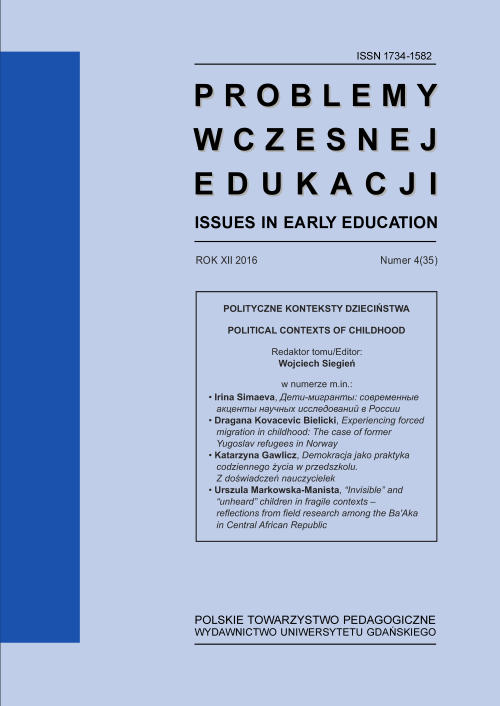“Invisible” and “unheard” children in fragile contexts – reflections from field research among the Ba’Aka in the Central African Republic
Słowa kluczowe:
, fragile contexts, field research, colonial and postcolonial reperesntationsAbstrakt
In the present article I outline the situation of children who belong to an indigenous community of Ba’Aka Pygmies, a group inhabiting the Sangha-Mbaéré region of rainforest in the Central African Republic. These children are inscribed in the categories of “invisible” and “unheard” children. They are also deprived of the right to be properly researched. This is due to a number of external and internal factors which shape the contemporary reality of the formerly colonised country. Despite the fact that the Central African Republic broke free from colonial oppression, since 1960s it has been experiencing internal colonisation and civilising missions by the countries of the Global North so as to be “fruitfully” written in the narrative of national development. Thus, referring to key categories, I discuss postcolonial representations: images and narratives perceived through the perspective of a female researcher who, since 2002, has conducted field research among excluded and marginalised children and young people in fragile (vulnerable) contexts in Central Africa.
Downloads
Bibliografia
Ahluwalia P. (2000), Towards (re)conciliation: the post-colonial economy of giving. “Social Identities”, 6 (1).
Bauman Z. (2005). Życie na przemiał. Kraków, Wydawnictwo Literackie.
Bauman Z. (2006), Liquid Fear. Cambridge, Polity Press.
Bauman Z. (2013), Liquid modernity. John Wiley & Sons.
Bauman Z. (2013), Wasted lives: Modernity and its outcasts. John Wiley & Sons.
Beazley H., Bessel S., Ennew J., Waterson R. (2009), The right to be properly researched: research with children in a messy, real world. “Children’s Geographies”, 7 (4).
Blanchard P., Bancel N., Boёtsch G., Deroo É., Lemaire S., Forsdick C. (eds.) (2008), Human Zoos: Science and Spectacle in the Age of Colonial Empires. Liverpool University Press, Liverpool.
Bush R. (2007), Poverty and neoliberalism: Persistence and reproduction in the global South. London, Pluto Press.
Cernea M.M., Schmidt-Soltau K. (2006), Poverty risks and national parks: Policy issues in conservation and resettlement. “World Development”, 34.10.
Colchester M. (1997). Salvaging nature: indigenous peoples and protected areas. In: K.B. Ghimire, M.P. Pimbert (eds.), Social change and conservation: environmental politics and impacts of national parks and protected areas. London, Earthscan Publications Limited.
Cornelissen S. (2005), Producing and Imaging ‘Place’ and ‘People’: The Political Economy of South African International Tourist Representation. “Review of International Political Economy”, 12 (4).
Ennew J., Swart-Kruger J. (2003), Introduction: Homes, Places and Spaces in the Construction of Street Children and Street Youth. “Children, Youth and Environments”, 13 (1), Spring 2003. From: http://colorado.edu/journals/cye.
Ennew J., Hastadewi Y., Plateau D-P. (2007), Seen, Heard – and Forgotten? Participation of children and young people in Southeast, East Asia and Pacific in events and forums leading to and following up on the United Nations General Assembly Special Session for Children. “Children, Youth and Environments”, 17 (1).
Ennew J., Abebe T., Bangyai R., Karapituck P., Kjørholt A.T. and Noonsup T. (2009), The Right to be Properly Researched: How to do Rights-based, Scientific Research with Children. Bangkok: Black on White Publications.
Fusco C. (1994), The other history of intercultural performance. TDR, 38 (1).
Gill P. (2010), Famine and foreigners: Ethiopia since live aid. Oxford University Press.
Halasa K., Annotated Bibliography. Ethics in Educational Research, http://www.aare.edu.au/pages/ annotated-bibliography.html.
Hewlett B.S., Lamb M.E. (2005), Hunter-gatherer Childhoods: Evolutionary, Developmental & Cultural Perspectives. New Brunswick, New Yersey, Transaction Publishers.
Invernizzi A., Liebel M., Milne B., Budde R. (eds.) (2016), Children Out of Place’ and Human Rights. In Memory of Judith Ennew. Springer.
Jahoda G. (1999), Images of savages: ancients [sic] roots of modern prejudice in Western culture. London and New York, Psychology Press.
Kaniowska K. (1999), Opis. Klucz do rozumienia kultury. „Łódzkie Studia Etnograficzne”, 39, Polskie Towarzystwo Ludoznawcze, Łódź.
Kisliuk M. (2000), Musical Life in the Central African Republic. In: R.M. Stone (ed.), The Garland Handbook of African Music. Vol. 1., Taylor & Francis.
Leszczyński A. (2013), Zbawcy mórz oraz inne afrykańskie historie. Warszawa, Wielka Litera.
Lévi-Strauss C. (1969), Myśl nieoswojona, A. Zajęczkowski (transl.), Warszawa, PWN.
Loomba A. (2011), Kolonializm/postkolonializmu, N. Bloch (transl). Poznań, Wyd. Poznańskie.
Malinowski B. (1922), Argonauts of the Western Pacific. London, Routledge & KeganPaul.
Malinowski B. (1932), Argonauts of the Western Pacific, Fundacja Nowoczesna Polska, Wolne Lektury, p. 20, based on: Malinowski B., Argonauts of the Western Pacific. An Account of Native Enterprise and Adventure in the Archipelagoes of Melanesian New Guinea. London, Routlege & Sons.
Mignolo W.D. (2014), The North of the South and the West of the East. A Provocation to the Question, http://www.ibraaz.org/essays/108/.
Penn H. (2005), Unequal Childhoods. Young children’s lives in poor countries. London, Routledge. Robinson M., Picard D. (Eds.) (2009), The Framed World: tourism, tourists and photography. Ashgate Publishing, Ltd.
Slater D. (2008), Geopolitics and the post-colonial: rethinking North-South relations. John Wiley & Sons.
“Survival International”, http://www.survivalinternational.org/tribes/pygmies.
Szulecki K., Wolf, Iskandar, Wilczura, Szulecki, Busza: Kmicic je kebab… „Orientalizm” po polsku?, „Kultura Liberalna” no 95 (45/2010) of 2 November 2010 http://kulturaliberalna.pl/2010/11/02/ wolff-iskandar-wilczura-szulecki-busza-kmicic-je-kebab%E2%80%A6-%E2%80%9Eorientali zm%E2%80%9D-po-polsku.
Tajfel H. (1981), Social stereotypes and social groups. In: J.T.C. Turner, H. Giles (eds.), Intergroup behavior. Oxford, Basil Blackwell.
Verdu P., Destro-Bisol G. (2012), African Pygmies, what’s behind a name? “Human Biology”, 84.1.
Wilson C. (2001), Decolonizing Methodologies: Research and Indigenous Peoples by Linda SLaterSmith, 1999, Zed Books, London, Social Policy Journal of New Zealand, December 2001.
Wrzesińska A. (2005), MWANA znaczy dziecko. Warszawa, DIALOG, Wyd. Akademickie.

 Uniwersyteckie Czasopisma Naukowe
Uniwersyteckie Czasopisma Naukowe





